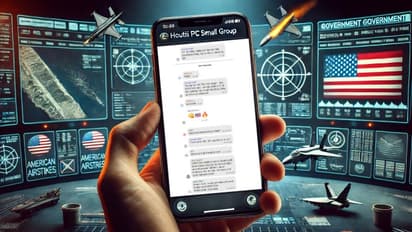Inside Trump officials' leaked Signal chat: Emojis, fist pump & more in real-time Yemen war planning (WATCH)

Synopsis
Leaked Signal chat reveals how top Trump officials planned and executed Yemen airstrikes in real-time, exposing security lapses and impulsive decision-making.
In an unprecedented leak, a Signal group chat has exposed how the Trump administration coordinated and launched airstrikes against Houthi targets in Yemen—via smartphone. The chat, titled “Houthi PC small group,” included top officials such as National Security Adviser Michael Waltz, Defense Secretary Pete Hegseth, CIA Director John Ratcliffe, DNI Tulsi Gabbard, and Vice President JD Vance.
The leak, first reported by The Atlantic’s Jeffrey Goldberg, not only reveals the real-time decision-making behind a major military operation but also raises serious questions about security lapses, legal violations, and the impulsive nature of modern American war planning.
A Mistaken Invite That Opened the Door
On March 11, 2025, Goldberg received a Signal message from Waltz, inviting him into the private discussion. Initially unnoticed by officials, Goldberg observed as high-level military and intelligence leaders openly debated strategy, weighed political optics, and finalized strike details—all in an unsecured group chat.
Within hours, the conversation escalated from coordination to execution. By March 14, the administration had greenlit the operation. However, even within the hawkish group, some officials raised concerns.
Policy Debates and Fractures Within the Administration
Vice President JD Vance questioned the urgency of the attack, noting that the Houthis posed a greater economic threat to Europe than to the US. He also expressed concerns over how the decision aligned with Trump’s broader messaging.
“only 3%. European exposure was much higher. Why rush in, he asked, without building public understanding? What about oil prices? Was the President aware of how this action conflicted with his broader messaging?” Vance asked in the chat.
Other officials shared his reservations. CIA Director Ratcliffe and DNI official Joe Kent suggested delaying the strikes to refine targeting. However, Defense Secretary Pete Hegseth pushed back.
“This is not about the Houthis,” Hegseth insisted. “It’s about restoring freedom of navigation. Reestablishing deterrence. Messaging is tough either way.”
The chat also revealed disdain for European allies. Hegseth referred to their navies as “PATHETIC,” while White House adviser Stephen Miller emphasized that the US should 'extract economic gain' if it was doing the heavy lifting.
March 15: The Attack in Real-Time
On March 15, the chat transformed into a virtual war room. At 11:44 a.m., Hegseth announced:
“WE ARE A GO.”
He outlined a precise timeline for the strikes:
F-18s launch at 12:15.
Drones hit at 2:15.
Tomahawks fly at 3:36.
By 1:55 p.m., social media reports from Sanaa confirmed explosions. Inside the chat, National Security Adviser Waltz updated officials: “The first building had collapsed. The target—a top Houthi missile commander—had been seen entering.”
Vance asked for confirmation, and Waltz clarified: “Typing too fast. The first target - their top missile guy - we had positive ID of him walking into his girlfriend's building and now it's collapsed."
Vance responded: “Excellent.”
The Aftermath: Celebration, Emojis, and Silence on Civilian Deaths
Once the operation concluded, the chat took on a celebratory tone. Officials exchanged emojis—fists, flags, and fire—while praising the strike. Marco Rubio (MAR) congratulated Hegseth’s team, and White House Chief of Staff Susie Wiles sent her blessings.
However, absent from the discussion was any acknowledgment of civilian casualties. The Yemeni health ministry later reported at least 53 deaths, but the chat contained no debate over collateral damage or potential diplomatic fallout.
Houthi PC Small Group: Complete leaked thread
The Security and Legal Fallout
The leak has triggered alarm in Washington. National security experts argue that transmitting sensitive military plans over Signal—an unapproved, unsecured platform—may have violated the Espionage Act and federal records laws. Some messages were even set to disappear, raising questions about illegal deletion of government records.
Despite the controversy, administration officials downplayed the breach.
“No classified info was shared,” insisted Defense and Intelligence chiefs. Trump himself dismissed the incident as “a mistake, and one to learn from.”
However, the leak has undermined one of Trump’s central campaign messages—strength and competence. While the strikes may have been militarily effective, the chaotic decision-making process has drawn scrutiny.
As JD Vance warned before the attack: “There is a real risk that the public doesn’t understand why this is necessary.”
Now, they do. But perhaps not in the way the administration intended.
The Yemen airstrikes will be remembered for their precision. But more than that, they will be remembered as a war launched through a group chat—where national security decisions were shaped by emojis, political grievances, and accidental transparency.
Check the Breaking News Today and Latest News from across India and around the world. Stay updated with the latest World News and global developments from politics to economy and current affairs. Get in-depth coverage of China News, Europe News, Pakistan News, and South Asia News, along with top headlines from the UK and US. Follow expert analysis, international trends, and breaking updates from around the globe. Download the Asianet News Official App from the Android Play Store and iPhone App Store for accurate and timely news updates anytime, anywhere.